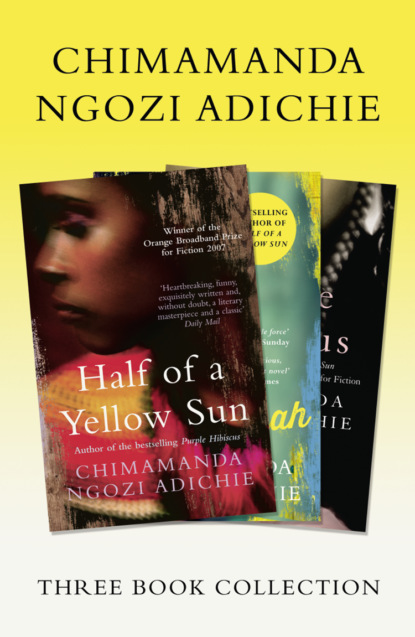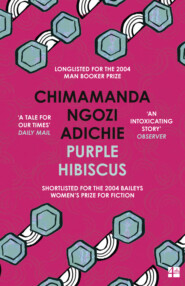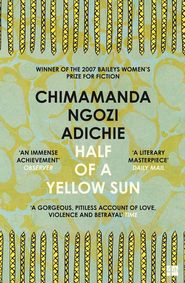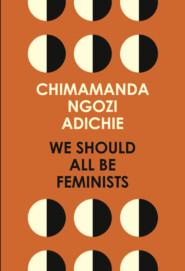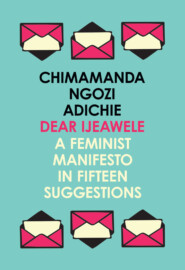По всем вопросам обращайтесь на: info@litportal.ru
(©) 2003-2024.
✖
Half of a Yellow Sun, Americanah, Purple Hibiscus: Chimamanda Ngozi Adichie Three-Book Collection
Автор
Год написания книги
2018
Настройки чтения
Размер шрифта
Высота строк
Поля
Madu laughed.
Kainene slipped her hand into Richard’s. ‘I was just telling Madu that you think another coup is coming.’
‘There won’t be another coup,’ Madu said.
‘You would know, wouldn’t you, Madu? Big Man colonel that you are now,’ Kainene teased.
Richard tightened his hold on her hand. ‘I went to Zaria last week, and it seemed that all everybody was saying was second coup, second coup. Even Radio Kaduna and the New Nigerian,’ he said in Igbo.
‘What does the press know, really?’ Madu replied in English. He always did that; since Richard’s Igbo had become near-fluent, Madu insistently responded to it in English so that Richard felt forced to revert to English.
‘The papers ran articles about jihad, and Radio Kaduna kept broadcasting the late Sardauna’s speeches, and there was talk about how Igbo people were going to take over the civil service and – ’
Madu cut him short. ‘There won’t be a second coup. There’s a little tension in the army, but there always is a little tension in the army. Did you have the goat meat? Isn’t it wonderful?’
‘Yes,’ Richard agreed, almost automatically, and then wished he hadn’t. The air in Lagos was humid; standing next to Madu, it seemed suffocating. The man made him feel inconsequential.
The second coup happened a week later, and Richard’s first reaction was to gloat. He was rereading Martin’s letter in the orchard, sitting on the spot where Kainene often told him that a groove the exact size and shape of his buttocks had appeared.
Is ‘going native’ still used? I always knew you would! Mothertells me you have given up on the tribal art book and are pleasedwith this one, a sort of fictionalized travelogue? And on EuropeanEvils in Africa! I’m quite keen to hear more about it whenyou are in London. Pity you gave up the old title: ‘The Basket ofHands’. Were hands chopped off in Africa as well? I’d imaginedit was only in India. I’m intrigued!
Richard imagined that smile Martin often had when they were schoolboys, during those years that Aunt Elizabeth had immersed them in activities with her manic determination that there be no sitting around: cricket tournaments, boxing lessons, tennis, piano lessons from a Frenchman with a lisp. Martin had thrived at them all, always with that superior smile of people who were born to belong and excel.
Richard reached out to pluck a wildflower that looked like a poppy. He wondered what Martin’s wedding would be like; Martin’s fiancée was a fashion designer, of all things. If only Kainene could go with him; if only she didn’t have to stay to sign the new contract. He wanted Aunt Elizabeth and Martin and Virginia to see her, but most of all he wanted them to see him, the man he had become after his years here: to see that he was browner and happier.
Ikejide came up to him. ‘Mr Richard, sah! Madam say make you come. There is another coup,’ Ikejide said. He looked excited.
Richard hurried indoors. He was right; Madu was wrong. The moist July heat had plastered his hair limply to his head, and he ran his hand through it as he went. Kainene was on a sofa in the living room, her arms wrapped around herself, rocking back and forth. The British voice on the radio was so loud that she raised her voice when she said, ‘Northern officers have taken over. The BBC says they are killing Igbo officers in Kaduna. Nigerian Radio isn’t saying anything.’ She spoke too fast. He stood behind her and began to rub her shoulders, kneading her stiff muscles in circular motions. On the radio, the breathless British voice said it was quite extraordinary that a second coup had occurred only six months after the first.
‘Extraordinary. Extraordinary indeed,’ Kainene said. She reached out, in a sudden jerky move, and pushed the radio off the table. It fell on the carpeted floor, and a dislodged battery rolled out. ‘Madu is in Kaduna,’ she said, and put her face in her hands. ‘Madu is in Kaduna.’
‘It’s all right, my darling,’ Richard said. ‘It’s all right.’
For the first time, he considered the possibility of Madu’s death. He decided not to go back to Nsukka for a while and was not sure why. Was it really because he wanted to be with her when she heard Madu was dead? In the next few days, she was so taut with anxiety that he too began to worry about Madu and then resent himself for doing so, and then resent his resentment. He should not be so petty. She included him in her worry, after all, as if Madu was their friend and not just hers. She told him about the people she called, about the inquiries she made to find out what had happened. Nobody knew. Madu’s wife had heard nothing. Lagos was in chaos. Her parents had left for England. Many Igbo officers were dead. The killings were organized; she told him about a soldier who said the alarm for a battalion muster parade was sounded in his barracks and after everyone assembled, the Northerners picked out all the Igbo soldiers and took them away and shot them.
Kainene was muted and quiet but never tearful, so the day she told him, ‘I heard something,’ with a sob in her voice, he was sure it was news of Madu. He thought about how to console her, whether he would be able to console her.
‘Udodi,’ Kainene said. ‘They killed Colonel Udodi Ekechi.’
‘Udodi?’ He had been so certain it was about Madu that for a moment he was blank.
‘Northern soldiers put him in a cell in the barracks and fed him his own shit. He ate his own shit.’ Kainene paused. ‘Then they beat him senseless and tied him to an iron cross and threw him back in his cell. He died tied to an iron cross. He died on a cross.’
Richard sat down slowly. His dislike for Udodi – loud, drunken, duplicity dripping from his pores – had only deepened in the past years. Yet hearing about his death left him sober. He thought, again, of Madu dying and realized he did not know how he would feel.
‘Who told you this?’
‘Maria Obele. Udodi’s wife is her cousin. She said they are saying that no Igbo officer in the North escaped. But some Umunnachi people said they heard Madu escaped. Adaobi has not heard anything. How could he have escaped. How?’
‘He might be hiding out somewhere.’
‘How?’ Kainene asked again.
Colonel Madu appeared in Kainene’s house two weeks later, much taller-looking now because he had lost so much weight; the angles of his shoulder bones were visible through his white shirt.
Kainene screamed. ‘Madu! Is this you? O gi di ife a?’
Richard was not sure who walked towards whom first, but Kainene and Madu were holding each other close, Kainene touching his arms and face with a tenderness that made Richard look away. He went to the liquor cabinet and poured a whisky for Madu and a gin for himself.
‘Thank you, Richard,’ Madu said, but he did not take the drink and Richard stood there, holding two glasses, before he placed one down.
Kainene sat on a side table in front of Madu. ‘They said they shot you in Kaduna, then they said they buried you alive in the bush, then they said you escaped, then they said you were in prison in Lagos.’
Madu said nothing. Kainene stared at him. Richard finished his drink and poured another.
‘You remember my friend Ibrahim? From Sandhurst?’ Madu asked finally.
Kainene nodded.
‘Ibrahim saved my life. He told me about the coup that morning. He was not directly involved, but most of them – the Northern officers – knew about it. He drove me to his cousin’s house, but I didn’t really understand until he asked his cousin to take me to the backyard, where he kept his domestic animals. I slept in the chicken house for two days.’
‘No! Ekwuzina!’
‘And do you know that soldiers came to search his cousin’s house to look for me? Everybody knew how close Ibrahim and I were, and they suspected he helped me escape. They didn’t check the chicken house, though.’ Colonel Madu paused, nodding and looking into the distance. ‘I did not know how bad chicken shit smelt until I slept in it for three days. On the third day, Ibrahim sent me some kaftans and money through a small boy and asked me to leave right away. I dressed as a Fulani nomad and walked through the smaller villages because Ibrahim said that artillery soldiers had set up blocks on all the major roads in Kaduna. I was lucky to find a lorry driver, an Igbo man from Ohafia, who took me to Kafanchan. My cousin lives there. You know Onunkwo, don’t you?’ Madu did not wait for Kainene to respond. ‘He is the station master at the railway, and he told me that Northern soldiers had sealed off Makurdi Bridge. That bridge is a grave. They searched every single vehicle, they delayed passenger trains for up to eight hours, and they shot all the Igbo soldiers they discovered there and threw the bodies over. Many of the soldiers wore disguises, but they used their boots to find them.’
‘What?’ Kainene leaned forwards.
‘Boots.’ Madu glanced at his shoes. ‘You know we soldiers wear boots all the time so they examined the feet of each man, and any Igbo man whose feet were clean and uncracked by harmattan, they took away and shot. They also examined their foreheads for signs of their skin being lighter from wearing a soldier’s beret.’ Madu shook his head. ‘Onunkwo advised me to wait for some days. He did not think I would make it across the bridge because they would recognize me easily under any disguise. So I stayed ten days in a village near Kafanchan. Onunkwo found me different houses to stay in. It was not safe to stay with him. Finally, he said he had found a driver, a good man from Nnewi, who would hide me in the water tank of his goods train. The man gave me a fireman’s suit to wear and I climbed into the tank. I had water up to my chin. Each time the train jerked, some of the water entered my nose. When we got to the bridge, the soldiers searched the train thoroughly. I heard footsteps on the lid of the tank and thought it was all over. But they did not open it and we passed. It was only then I knew that I was alive and I would survive. I came back to Umunnachi to find Adaobi wearing black.’
Kainene kept looking at Madu long after he finished speaking. There was another stretch of silence, which made Richard uncomfortable because he was not sure how to react, what expression to have.
‘Igbo soldiers and Northern soldiers can never live in the same barracks after this. It is impossible, impossible,’ Colonel Madu said. He had a glassy sheen in his eyes. ‘And Gowon cannot be head of state. They cannot impose Gowon on us as head of state. It is not how things are done. There are others who are senior to him.’
‘What are you going to do now?’ Kainene asked.
Madu did not seem to hear her. ‘So many of us are gone,’ he said. ‘So many solid, good men – Udodi, Iloputaife, Okunweze, Okafor – and these were men who believed in Nigeria and didn’t care for tribe. After all, Udodi spoke better Hausa than he spoke Igbo, and look how they slaughtered him.’ He stood up and began to pace the room. ‘The problem was the ethnic balance policy. I was part of the commission that told our GOC that we should scrap it, that it was polarizing the army, that they should stop promoting Northerners who were not qualified. But our GOC said no, our British GOC.’ Madu turned and glanced at Richard.
‘I’ll ask Ikejide to cook your special rice,’ Kainene said.
Madu shrugged, silent, and stared out of the window.
10 (#u3c1576f1-c916-57b7-bb43-a63c028a7109)
Ugwu set the table for lunch. ‘I’ve finished, sah,’ he said, although he knew Master would not touch the okro soup and would keep walking up and down the living room with the radio turned up high, as he had been doing since Miss Adebayo left about an hour ago. She had banged so hard on the front door that Ugwu worried the glass would crack, and then when he opened it, she pushed past him, asking, ‘Where is your master? Where is your master?’
‘I will call him, mah,’ Ugwu said, but Miss Adebayo had hurried ahead into Master’s study. He heard her say, ‘There’s trouble in the North,’ and his mouth went dry because Miss Adebayo was not an alarmist and whatever was happening in the North had to be serious and Olanna was in Kano.
Ever since the second coup some weeks ago, when the Igbo soldiers were killed, he had struggled to understand what was happening, read the newspapers more carefully, listened more closely to Master and his guests. The conversations no longer ended in reassuring laughter, and the living room often seemed clouded with uncertainties, with unfinished knowledge, as if they all knew something would happen and yet did not know what. None of them would ever have imagined that this would happen, that the announcer on ENBC Radio Enugu would be saying now, as Ugwu straightened the tablecloth, ‘We have confirmed reports that up to five-hundred Igbo people have been killed in Maiduguri.’





